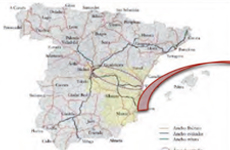
Categories
Publications
Methodology to determine the optimal design speed in a High-Speed Line
6/7/2018

Over the past 30 years, high-speed railway in Europe has experienced a great development due to, among other things, the reduction of travel times, the increase of frequency and the continuous improvement of service quality.
However, the construction of a new high-speed railway infrastructure requires an enormous mobilization of resources, has a long lifetime and the alternative uses of this huge investment are very few. Consequently, this kind of investment is always preceded by a rigorous analysis in order to ensure the best possible results.
In an analysis of these characteristics, there are different variables that have an influence on costs and benefits that a high-speed line could generate and, therefore, it can be asserted that there are certain parameters with direct impact on the profitability of a high-speed line; among them, maximum design speed of a high-speed line can be highlighted. If real experiences are analysed, real highspeed lines currently in service or under construction, maximum design speed is, essentially, the same all over the European high-speed networks (300km/h or 350km/h), a solid reason behind this pre-determined speed has not been found.
The design speed plays a crucial role in a framework in which the efficiency and the social benefit are essential. A higher design speed implies higher investment costs and, sometimes, implies slight increases in exploitation costs, but also brings journey time reductions and, consequently, an increase in the number of passengers that implies an increase in revenues and time savings.
At this point, this paper develops a methodology capable of obtaining the maximum design speed that allows obtaining the maximum revenues with the minimal cost, which implies achieving the maximum profitability of a high-speed railway line.
Download paper »


